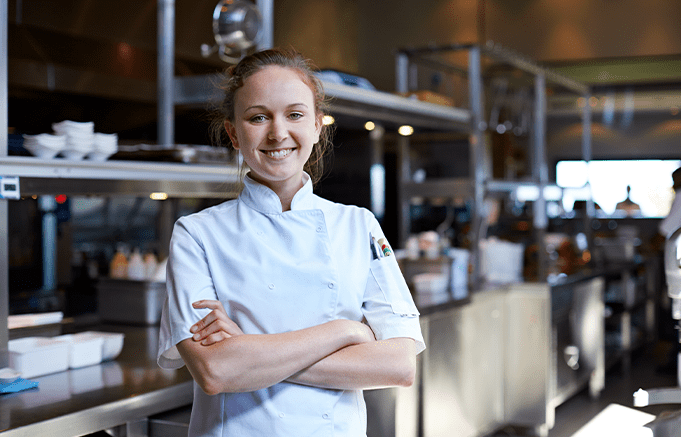Alternative careers for chefs that are diverse and rewarding

If you're passionate about food and have culinary expertise, the culinary arts is a fulfilling career option that can lead to many exciting opportunities. While becoming a professional chef is one of the more common career paths, working in a commercial kitchen is not your only option for a lucrative career working in the food industry.
There are several alternative careers for passionate chefs that still enable you to use your creativity, passion for food, and attention to detail to create memorable experiences. The industry offers numerous and diverse opportunities for growth and development and the chance to work with other talented professionals in a dynamic and fast-paced environment.
What are some alternative careers for chefs?
Whether working in a commercial kitchen for a restaurant or in a private kitchen as a personal chef, being a chef is a good career choice for many. However, there are plenty of alternative jobs for chefs that let you pursue a creative culinary career where you can utilize your knowledge and skills.
For example, have you considered becoming a food writer, food and beverage manager, food stylist, food photographer, culinary consultant, culinary teacher, demonstrator, or food blogger? Each of these culinary career paths offers exciting and rewarding opportunities for talented individuals who are interested in the culinary arts and have studied at a leading culinary school in France. They provide a chance to use your unique skills, knowledge, and creativity and remain an integral part of the food industry.

Alternative careers in the food industry
Many alternative career paths are available in the food industry if you are hard-working and passionate about food and cuisine arts. A bachelor in culinary arts will stand you in good stead for any of these alternative culinary careers.
Culinary writing and food journalism
Culinary writing and food journalism are excellent career options if you love food and enjoy writing. You can write about food and your culinary experiences in various formats, such as food blogs, magazines, newspapers, and cookbooks. You might also review restaurants and create content for food-related websites and social media.
Can chefs work as food writers?
Many commercial and private chefs have successfully transitioned into food writing careers, creating their own cookbooks, writing for food magazines and blogs, and even becoming food critics.
Working as a food writer can be a rewarding career for chefs who enjoy exploring the culinary world from a different perspective, sharing their knowledge and expertise with others, and developing their writing skills. Some famous chefs who have successfully turned food writing into a career include Julia Child, Samin Nosrat, Heston Blumenthal, Anthony Bourdain, and Jamie Oliver.
Food and beverage management
Food and beverage management is a popular alternative career path for chefs. In this role, you'll manage the operations of restaurants, bars, and other food service businesses. You'll be responsible for overseeing staff, inventory, finances, and customer service.
Food and beverage managers must have strong leadership and communication skills, as well as business acumen. You'll be required to develop and implement budgets, menus, marketing strategies, and training programs for staff. You'll also need to be up-to-date on the latest industry trends and regulations.
Culinary consulting
A culinary consultant provides expert advice and guidance to restaurants, hotels, catering companies, and other food-related businesses. They help these businesses improve their menus, kitchen operations, and overall customer experience.
Culinary consultants often have years of experience working in the food industry and have an in-depth understanding of food trends, ingredients, and cooking techniques. They may also have a background in business or management, allowing them to help clients with financial planning, cost analysis, and marketing strategies.
What skills do chefs need to become food consultants?
Professional chefs who aspire to become food consultants must have a broad range of culinary knowledge and experience, as well as strong business acumen, project management, creativity, and communication skills.
Food stylist and photography
Food stylists and photographers create visually appealing food images for various media, such as advertisements, cookbooks, magazines, and social media. Food stylists work with photographers, chefs, and other culinary professionals to prepare and style food for photography or filming.
To become a food stylist or photographer, you'll need to have a strong sense of aesthetics, creativity, attention to detail, and knowledge of food presentation. They should also have technical food preparation and photography skills, plus experience with photo editing software.
Cooking instruction and demonstration
Cooking instruction and demonstration is a popular alternative career for chefs who enjoy teaching and sharing their passion for food with others. Cooking instructors typically teach cooking classes or conduct cooking demonstrations for individuals or groups at cooking schools, community centers, or private events. They may work for culinary schools, community centers, or other educational institutions. Some chefs also offer private cooking classes or work as freelance instructors.
Food blogging and social media influencer
Food blogging and social media influencer have become popular careers, especially with the rise of foodie culture and social media platforms such as Instagram, TikTok, and YouTube.
As a food blogger or social media influencer, you can create content about food and cooking, share recipes, review restaurants, and promote food-related products and services. Some of the most successful food bloggers and social media influencers in recent years include Molly Yeh, Half Baked Harvest, and The Minimalist Baker.
Build the foundations of your culinary career with this world-class degree
Learn the culinary skills and business expertise to become a leader in the culinary industry.

Alternative careers outside the food industry
There are several alternative culinary careers outside the kitchen suited to culinary professionals, such as corporate catering management, teaching and education, and entrepreneurship. Each career offers unique opportunities for culinary professionals to apply their skills and experience outside of a traditional chef role.
Corporate catering management
Corporate catering management involves planning and executing large-scale catering events for corporate clients. This includes coordinating with event planners, chefs, and vendors and managing budgets, timelines, and staff. You'll find career opportunities in corporate catering management in various industries, including hotels, convention centers, and corporate event planning companies.
What is the role of a corporate catering manager?
The role of a corporate catering manager involves overseeing the planning and execution of food service for corporate events and meetings. This includes coordinating menus, managing budgets, and ensuring food quality and safety. They are also responsible for hiring and training staff and developing client relationships to understand their needs and preferences and may also work with vendors and suppliers to source ingredients and equipment.
Teaching and education
Teaching and education in culinary arts can be a rewarding career path for experienced chefs who want to share their knowledge and skills with aspiring chefs. They can work as food science and culinary arts instructors in vocational schools, community colleges, or universities. Responsibilities may include creating and delivering lesson plans, assessing students' progress, and providing feedback. To pursue a teaching career, chefs may need to obtain a teaching certification or a degree in education.
Can chefs become culinary educators?
With their extensive knowledge of the culinary arts and hands-on experience of working in kitchens, chefs can certainly become successful culinary educators. Many culinary schools and institutions employ experienced chefs who are passionate about teaching and mentoring aspiring culinary professionals. As culinary educators, chefs can share their knowledge and expertise with the next generation of culinary professionals and help shape the future of the culinary industry.
Entrepreneurship
Entrepreneurship in the food industry is a popular career path for executive chefs and culinary professionals who want to start their own businesses. You may be considering starting a food truck business, opening a restaurant, launching a catering company, or even creating a line of food products. Successful entrepreneurship in the food industry requires strong culinary skills, business acumen, financial management skills, and marketing savvy.

What does it take to be an entrepreneur in the food industry?
To be a food industry entrepreneur, you'll need strong business acumen, as entrepreneurship requires creating and managing a successful food-related business. Good communication and interpersonal skills are also important, as building relationships with customers, suppliers, and staff is crucial.
You'll also need excellent attention to detail, an understanding of food safety regulations, and a strong passion for food. Aspiring food entrepreneurs should also be willing to take risks, learn from failures, and continuously adapt to changing market trends and customer preferences. A diploma in culinary arts provides an excellent foundation for helping entrepreneurs establish their culinary concepts and get started on their career journey.

Learn the secrets of French pastry arts with world class patisserie training.
With this diploma, you’ll learn expert patisserie techniques, build a network of contacts and lay the foundations to a successful career.
While a culinary arts degree from a world-class culinary school like École Ducasse can certainly prepare you for a career as a chef, it can also open doors to a number of alternative culinary career paths in and outside the hospitality industry that are equally as exciting and rewarding. In addition to honing your cooking skills, a culinary school can provide a well-rounded education in all areas, including food safety, nutrition, and management. This can prepare you for careers in areas such as food writing, teaching, food styling and photography, demonstrating, catering management, and consultancy.


